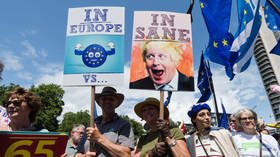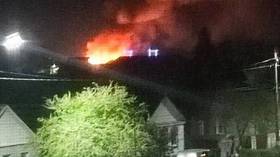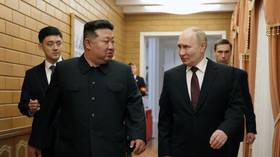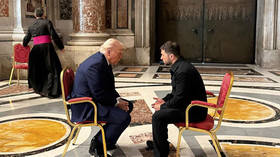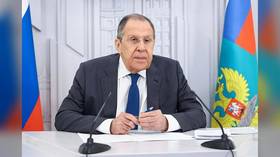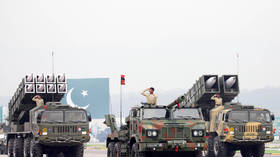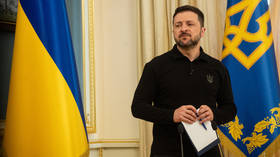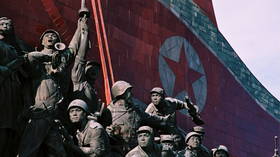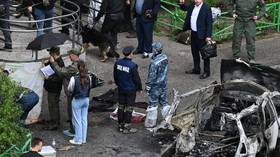Macron plays Russian card as part of strategy to place France at center of international stage
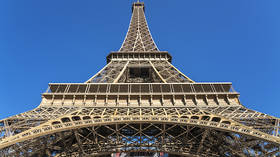
Macron’s recent unilateral actions, far from ending any supposed isolation of Russia, are clearly designed to end what has sometimes appeared to be France’s isolation in Europe.
In his annual address to French ambassadors from around the world in Paris on August 27, President Emmanuel Macron repeated the message he had delivered in front of Vladimir Putin at his summer residence the previous week: Europe would be committing a major strategic error if it continued to exclude Russia from its councils. It was time, he said, to “reshuffle the cards” in this difficult relationship and he repeated his call for a – as yet undefined – “common architecture” linking Russia and Europe.
To be fair, this is not entirely new music emanating from the Elysee Palace. Macron invited Putin to Versailles less than a month after his election in 2017. He traveled to the Economic Forum in St. Petersburg in 2018, where France was the guest of honor. And he seemed to want to associate Russia with the G7, even without re-integrating her formally into that structure, when he invited President Putin to the Bregancon Fort on August 19, just days before the G7 summit in Biarritz. The contrast has been striking for two years now between France’s openness to Russia and London’s increasing hostility to her.
Also on rt.com Macron knows for Europeans the ‘problem’ country is not Russia but US (by George Galloway)Yet Macron’s new Russian initiative, which he reaffirmed in the form of an order given in public to his diplomats and ministers, is clearly designed to send a new message. France under Francois Hollande adopted a stern anti-Russian tone after the Ukraine conflict of 2014 and, although Macron does not propose to lift any sanctions, he clearly wants that policy to change.
His unilateral actions, like the invitations issued to the Indian prime minister and the Iranian foreign minister to attend the G7, are intended to place France at the center of the international stage. Indeed, far from ending any supposed isolation of Russia, these actions, taken together, are clearly designed to end what has sometimes appeared to be France’s isolation in Europe.
Paris knows that, however hawkish Angela Merkel may have sounded over Ukraine, Germany continues to trade massively with Russia. Paris also knows how much damage Brexit will do to the balance of power in Europe – which explains the extraordinary vitriol which can be heard from French officials these days against the British.
Ever since the Saint Malo declaration by Britain and France in 1998, France has tried to counter-balance Germany’s economic hegemony by strengthening military cooperation with the British, thereby combining the strength of Europe’s two biggest armies in an area, the military, where Germany, for historical reasons, cannot compete. With Britain now turning her back on Europe, at least figuratively, France is left “alone” facing a German giant she cannot control.
Macron’s decision to play the Russian card in this situation is nothing but classic geopolitics. As the former adviser to President Georges Pompidou, Marie-France Garaud, has often said, the only two choices in French foreign policy are whether to ally with Britain or with Russia against Germany. However much the British may protest that they are not “leaving Europe,” which in any case is a geographical impossibility, the fact is that Brexit gives Britain a magnificent opportunity to deepen its contacts across the enormous English-speaking world.
Also on rt.com Macron’s G7 proves the US-dominant talk shop is heading for the dinosaur graveyardBritain’s decision to renew with its maritime tradition leads inevitably to the desirability of a continental alliance including Russia. This is why, on August 27, Macron said that only an alliance with Russia can produce “a true European strategy.” Losing Britain “to America,” as Macron sees it, and Russia “to China,” would leave a rump EU based on a frail Franco-German alliance, quite incapable of standing up to either geopolitical pole. Emmanuel Macron said, rather rudely, that Russia’s vocation is not to play second fiddle (“l’allie minoritaire”) to China, just as he had said a day or two earlier that Britain should not become a “vassal” of the United States.
READ MORE: Macron warns UK could become US vassal state. I bet he asked Merkel first
Indeed, when Macron said, on August 27, that “the European continent will never be stable, will never be in security, if we don’t pacify and clarify our relations with Russia,” he was re-stating a geopolitical truth which European chancelleries have repeatedly forgotten to their cost.
Numerous are the occasions when international diplomacy has sought to exclude Russia, or to push her influence as far back as possible to the north and the east, outside of European affairs.
Also on rt.com Putin-Macron meeting heralds glorious summer after long winter of discontentIn 1878, the Congress of Berlin sought to dilute any increased Russian influence in the Balkans following Russia’s victory in the war against Turkey of 1877-1878. The result was a dramatic increase in the power of Austria in the Balkans to counteract Russia: Bosnia-Herzegovina was placed under Austrian rule. This in turn led not only to an increase in tensions with Russia, especially after Austria annexed the province in 1908, but also to nationalist unrest there.
The assassination of the Archduke Franz Ferdinand in Sarajevo in June 1914 was, to some extent, the consequence of the Congress of Berlin and of the exclusion of Russia. As the Cambridge historian Dominic Lieven shows brilliantly in his ‘Towards the Flame’ , the First World War was in a sense primarily a war in the East between the Germanic powers and the Russian empire, and only secondarily a war fought in the trenches of Belgium and northern France.
Europe repeated the mistake at the Versailles peace conference in 1919, from which the Soviet Union was, like Germany, excluded. According to the inexorable laws of diplomacy, which resembles Newton’s third law, the exclusion of a state inevitably leads it to conclude alliances with other excluded states. Within a few years of Versailles, Weimar Germany and Soviet Russia signed the Treaty of Rapallo (1922) which is widely regarded as a major failure of Western policy because the two humiliated states joined forces to repel Western triumphalism.
Without wishing to push historical analogies too far, we witnessed a second Rapallo this year. It was deeply symbolic that, while the Western powers were congratulating themselves on the 75th anniversary of the Normandy landings, a celebration which implied that the Second World War had been won by Americans, Canadians, British and French alone, and not by the USSR or China, President Putin was hosting President Xi in Moscow where he called him “my best friend.”
Also on rt.com Lest we forget? Western amnesia about Soviet role in WWII victory has some disturbing aspects…It goes without saying that the same error was repeated again after the Second World War, when the breakdown in relations between East and West led to the Cold War. This conflict not only structured the entire international system for many decades, dividing Europe in the process, it also led to myriad proxy wars in Africa, Asia and Latin America. It is difficult to think of a clearer illustration of Macron’s dictum about the necessity of peace with Russia than the period 1948-1989.
Emmanuel Macron seems, therefore, to have confirmed his belief in the classical theory of international relations, according to which they should be conducted according to the discernible realities of power and geography, and not according to the misleading temptations of ideology.
He has, in short, enunciated a state-based vision instead of a values-based one.
It is striking that this approach is diametrically the opposite of that adopted by the European Union as an institution for the last five years, which has struggled to regain some internal cohesion by presenting Russia as a bug-bear which threatens the post-modern values for which Europe stands. If Macron appeals over the heads of the EU bodies in order to project France’s specific role as an international mediator, then he will deserve credit for pursuing a genuinely European policy instead of the present bogus so-called “European” policy designed by the bureaucrats in Brussels for their own shoddy ends.
Like this story? Share it with a friend!
The statements, views and opinions expressed in this column are solely those of the author and do not necessarily represent those of RT.




